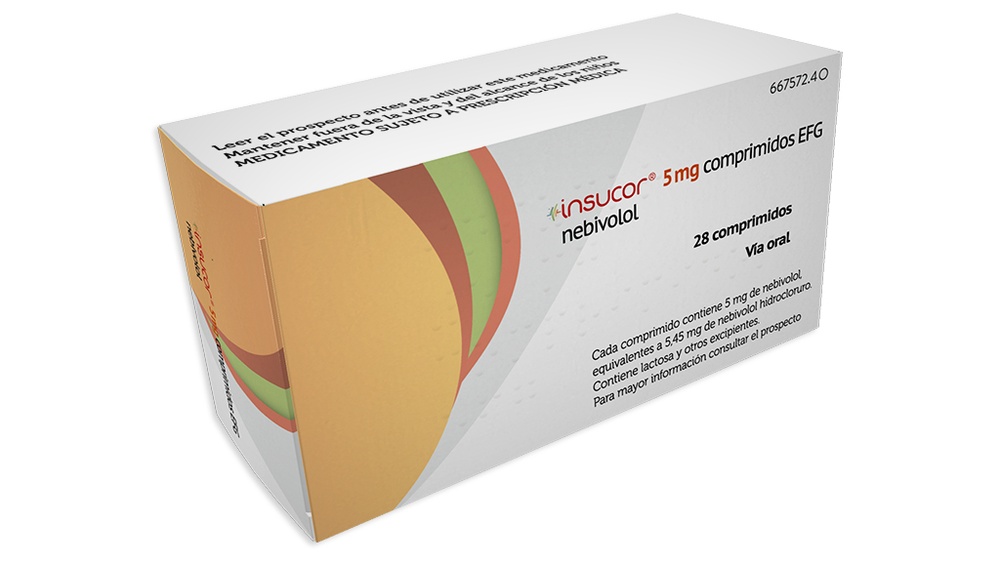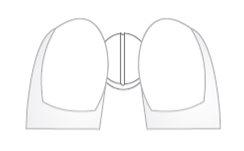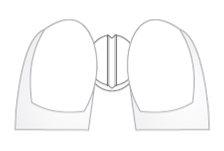
INSUCOR 5 mg TABLETS


How to use INSUCOR 5 mg TABLETS
Translated with AI
This page provides general information and does not replace a doctor’s consultation. Always consult a doctor before taking any medication. Seek urgent medical care if symptoms are severe.
Show originalContents of the leaflet
Introduction
Package Leaflet: Information for the User
Insucor 5 mg Film-Coated Tablets EFG
nebivolol
Read all of this leaflet carefully before you start taking this medicine because it contains important information for you.
- Keep this leaflet, you may need to read it again.
- If you have any further questions, ask your doctor or pharmacist.
- This medicine has been prescribed for you only. Do not pass it on to others. It may harm them, even if their signs of illness are the same as yours.
- If you get any side effects, talk to your doctor or pharmacist. This includes any possible side effects not listed in this leaflet. See section 4.
Contents of the pack and other information:
- What is Insucor and what is it used for
- What you need to know before you take Insucor
- How to take Insucor
- Possible side effects
- Storing Insucor
- Contents of the pack and further information
1. What is Insucor and what is it used for
Insucor contains nebivolol, a cardiovascular medicine, belonging to the group of selective beta-blockers (with selective activity on the cardiovascular system). It prevents an increase in heart rate and controls the heart's pumping force. It also has a vasodilating effect on blood vessels, which in turn helps to lower blood pressure.
It is used to treat high blood pressure (hypertension).
Insucor is also used to treat mild and moderate chronic heart failure in patients aged 70 or over, in combination with other medicines.
2. Before taking Insucor
Do not takeInsucor
- if you are allergic to nebivolol or any of the other ingredients of this medicine (listed in section 6).
- if you have any of the following conditions:
- low blood pressure
- severe circulation problems in your arms or legs.
- a very slow heart rate (less than 60 beats per minute)
- other severe heart rhythm problems (e.g. second and third degree atrioventricular block, cardiac conduction disorders).
- heart failure that has recently worsened or if you are receiving intravenous treatment to help your heart work after suffering a circulatory collapse due to acute heart failure.
- asthma or difficulty breathing (currently or in the past), pheochromocytoma, a tumor located in the upper part of the kidneys (adrenal glands) that is not being treated.
- liver function disorder.
- metabolic disorder (metabolic acidosis), such as diabetic ketoacidosis.
Warnings and precautions
Talk to your doctor or pharmacist before you start taking Insucor.
Tell your doctor if you have or develop any of the following problems:
- abnormally slow heart rate
- a type of chest pain due to a spontaneous spasm of the heart arteries, called Prinzmetal's angina
- untreated chronic heart failure
- first-degree cardiac block (a type of mild cardiac conduction disorder that affects the heart rhythm)
- poor circulation in arms or legs, such as Raynaud's disease or pain when walking similar to a cramp.
- chronic respiratory problems.
- diabetes: this medicine has no effect on blood sugar levels, but it can mask the warning signs produced by a decrease in these levels (e.g. palpitations, rapid heart rate) and may increase the risk of severe hypoglycemia when used with certain antidiabetic medicines called sulfonylureas (e.g. gliquidone, gliclazide, glibenclamide, glipizide, glimepiride, or tolbutamide).
- overactive thyroid gland: this medicine can mask the symptoms of rapid heart rate due to this condition.
- allergy, this medicine can increase your reaction to pollen or other substances you are allergic to.
If you have severe kidney problems, talk to your doctor before taking Insucor to treat your heart failure.
When starting treatment for chronic heart failure, you will be closely monitored by your doctor (see section 3).
This treatment should not be stopped abruptly, unless clearly indicated and evaluated by your doctor (see section 3).
Children and adolescents
Do notuse Insucor in children and adolescents due to the lack of data on the use of this medicine in these patients.
Other medicines and Insucor
Tell your doctor or pharmacist if you are using, have recently used, or might use any other medicines.
Always tell your doctor if, in addition to Insucor, you are using any of the following medicines:
- Medicines to control blood pressure or medicines used to treat heart diseases (such as amiodarone, amlodipine, cibenzoline, clonidine, digoxin, diltiazem, disopyramide, felodipine, flecainide, guanfacine, hydroquinidine, lacidipine, lidocaine, methyldopa, mexiletine, moxonidine, nicardipine, nifedipine, nimodipine, nitrendipine, propafenone, quinidine, rilmenidine, verapamil)
- Sedatives and therapies used in the treatment of psychosis (mental illness) e.g. barbiturics (also used to treat epilepsy), phenothiazine (also used for vomiting and nausea) and thioridazine.
- Medicines used to treat depression e.g. amitriptyline, paroxetine, and fluoxetine.
- Medicines used for anesthesia during an operation.
- Medicines used to treat asthma, nasal congestion, or certain eye disorders such as glaucoma (increased pressure in the eye) or pupil dilation.
- Baclofen (an antispastic medicine); amifostine (a protective medicine used during cancer treatment).
- Medicines for diabetes, such as insulin or oral antidiabetics.
All these medicines, like nebivolol, can affect blood pressure and/or heart function.
- Antimalarials (mefloquine).
- Medicines to treat excess stomach acid or ulcers (antacids): you should take Insucor during meals, and the antacid between meals.
Taking Insucor with food and drinks
See section 3.
Pregnancy and breastfeeding
Pregnancy
Insucor should not be taken during pregnancy unless clearly necessary.
Breastfeeding
It is not recommended during breastfeeding.
If you are pregnant or breastfeeding, think you may be pregnant, or are planning to have a baby, ask your doctor or pharmacist for advice before taking this medicine.
Driving and using machines
This medicine may cause dizziness or fatigue. If this happens, do notdrive or use machines.
Insucor contains lactose
This medicine contains
Insucor contains sodium
This medicine contains less than 1 mmol of sodium (23 mg) per film-coated tablet; this is, essentially “sodium-free”.
3. How to take Insucor
Follow exactly the administration instructions of this medicine given by your doctor. In case of doubt, consult your doctor or pharmacist again.
Insucor can be taken before, during, or after meals, but it can also be taken independently of them. It is preferable to take the tablet with a little water.
Treatment of high blood pressure (hypertension)
- The usual dose is 5 mg (one tablet) per day. It is preferable to take the dose always at the same time of day.
- In elderly patients and/or with kidney problems, it is recommended to start treatment with 2.5 mg (half a 5 mg tablet) per day.
- The therapeutic effect on blood pressure is achieved after 1 to 2 weeks of treatment. Occasionally, the optimal effect is achieved only after 4 weeks.
- If you are over 75 years old, you may need closer monitoring by your doctor.
Treatment of chronic heart failure
- Your doctor will closely monitor the treatment.
- Your doctor will start treatment with 1.25 mg per day. For this dose, a presentation of these tablets containing a different amount of the active substance (2.5 mg) is needed. Your doctor may increase the dose to 2.5 mg (half a tablet) per day; then to 5 mg (one tablet) per day and subsequently to 10 mg (two tablets) per day until the correct dose for you is reached. Your doctor will prescribe the dose that is correct for you at each step and you should carefully follow your doctor's instructions.
- The maximum recommended dose is 10 mg.
- When starting treatment and each time the dose is increased, it will be necessary for an experienced doctor to closely monitor you for two hours.
- Your doctor may decrease the dose if necessary.
- You should not stop taking the medicine abruptly, as this could lead to worsening of heart failure.
- Patient with severe kidney problems should not take this medicine.
- Take your medicine once a day, preferably at the same time of day.
Your doctor may decide that it is necessary to combine these tablets with other medicines to treat your disease.
If your doctor has told you to take ½ (half) a tablet daily, see the instructions below on how to break Insucor 2.5 mg and Insucor 5 mg tablets into equal doses.
- Place the tablets on a flat, hard surface (e.g. a table or countertop), with the break line facing up.
- Break the tablet by pushing it with the index fingers of both hands placed along the break line (Diagrams 1 and 2).


Diagram 1 Diagram 2
Diagrams 1 and 2: easy breaking of Insucor 2.5 mg and Insucor 5 mg tablets into equal doses.
Use in children and adolescents
Do not use in children and adolescents.
If you take more Insucor than you should
If you have accidentally taken an overdose of this medicine, consult your doctor or pharmacist immediatelyor call the Toxicology Information Service, telephone 91 562 04 20, indicating the medicine and the amount taken. The symptoms and signs most frequently reported in case of overdose are related to very slow heart rate (bradycardia), low blood pressure with possible fainting (hypotension), difficulty breathing such as in asthma (bronchospasm), and acute heart failure.
You can take activated charcoal (available at your pharmacy) while waiting.
If you forget to take Insucor
If you forget to take a dose of Insucor, but remember soon after when you should have taken it, take the daily dose as usual. On the other hand, if a lot of time has passed (several hours), so that it is close to the next dose, skip the missed dose and take the next scheduled doseat the usual time. Do not take a double dose. However, you should try to avoid repeated forgetting of taking the medicine.
If you stop taking Insucor
Always consult your doctor before stopping treatment with Insucor, whether you are taking it for high blood pressure or chronic heart failure.
Do not stop treatment abruptly. Always consult your doctor before stopping treatment with Insucor, whether you are taking it for high blood pressure or chronic heart failure.
If it is necessary to stop treatment for chronic heart failure, the daily dose should be gradually decreased, starting by halving the dose at weekly intervals. If you have any other doubts about the use of this medicine, ask your doctor or pharmacist.
4. Possible side effects
Like all medicines, this medicine can cause side effects, although not everybody gets them.
Stop taking nebivolol and talk to your doctor immediately if you have any of the following side effects:
- allergic reactions throughout the body, with generalized skin rashes (hypersensitivity reactions)
- sudden swelling, especially around the lips, eyelids, and/or tongue, which may be accompanied by acute difficulty breathing (angioedema).
- Skin rash characterized by pink, raised patches that itch, of allergic or non-allergic origin (urticaria)
- Difficulty breathing like in asthma, due to a sudden contraction of the muscles surrounding the airways. Feeling of tightness in the chest, difficulty breathing, or wheezing (bronchospasm)
When Insucor is used to treat high blood pressure, its possible side effects are:
Common side effects (may affect up to 1 in 10 people):
- headache
- dizziness
- fatigue
- unusual sensation of itching or tingling
- diarrhea
- constipation
- nausea
- shortness of breath
- swelling of the hands or feet
Uncommon side effects (may affect up to 1 in 100 people):
- slow heart rate or other heart problems
- low blood pressure
- pain when walking similar to a cramp
- abnormal vision
- impotence (difficulty achieving an erection)
- feelings of depression
- digestive difficulties (dyspepsia), stomach or intestinal gas (indigestion)
- vomiting
- skin rash, itching
- difficulty breathing like in asthma, due to a sudden contraction of the muscles surrounding the airways. Feeling of tightness in the chest, difficulty breathing, or wheezing (bronchospasm)
- nightmares
Rare side effects (may affect up to 1 in 10,000 people):
- fainting
- worsening of psoriasis (a skin disease characterized by scaly pink patches)
The following side effects have been reported in some isolated cases during treatment with this medicine:
- allergic reactions throughout the body, with generalized skin rashes (hypersensitivity reactions)
- sudden swelling, especially around the lips, eyelids, and/or tongue, which may be accompanied by acute difficulty breathing (angioedema)
- Skin rash characterized by pink, raised patches that itch, of allergic or non-allergic origin (urticaria)
In a clinical study for chronic heart failure, the following side effects were observed:
Very common side effects (may affect more than 1 in 10 people):
- slow heart rate
- dizziness
Common side effects (may affect up to 1 in 10 people):
- worsening of heart failure
- low blood pressure (such as feeling dizzy when standing up quickly)
- intolerance to this medicine
- mild cardiac conduction disorder that affects the heart rhythm (first-degree atrioventricular block)
- swelling of the lower limbs (such as swelling of the ankles)
Reporting of side effects
If you experience any side effects, talk to your doctor or pharmacist. This includes any possible side effects not listed in this leaflet. You can also report side effects directly through the Spanish Pharmacovigilance System for Human Use Medicines: https://www.notificaram.es. By reporting side effects, you can help provide more information on the safety of this medicine.
5. Storing Insucor
Keep this medicine out of the sight and reach of children.
Do not use this medicine after the expiry date which is stated on the carton and blister after EXP.
The expiry date is the last day of the month stated.
This medicine does not require any special storage conditions.
Medicines should not be disposed of via wastewater or household waste. Ask your pharmacist how to dispose of medicines no longer required. These measures will help protect the environment.
If the medicine changes color or shows any signs of deterioration, ask your pharmacist for advice on what to do.
6. Packaging Content and Additional Information
Composition of Insucor
The active ingredient is nebivolol.
Each tablet contains 5 mg of nebivolol, equivalent to 5.45 mg of nebivolol hydrochloride.
The other components are:
Lactose monohydrate, corn starch, sodium croscarmellose, hypromellose, microcrystalline cellulose, anhydrous colloidal silica, and magnesium stearate.
Appearance of the Product and Packaging Content
Biconvex, uncoated tablets, circular in shape and white in color, with the legend “N” and “L” engraved on either side of a score line on one side, and smooth on the other.
The tablet can be divided into equal doses.
Insucor 5 mg tablets are available in blister packs containing 14, 28, 30, 50, 90, 98, or 100 tablets.
Not all pack sizes may be marketed.
Marketing Authorization Holder and Manufacturer
Marketing Authorization Holder:
Glenmark Arzneimittel GmbH
Industriestr. 31
82194 Gröbenzell
Germany
Manufacturer:
Glenmark Pharmaceuticals s.r.o.
Fibichova 143
56617 Vysoke Myto
Czech Republic
Glenmark Generics (Europe) Ltd.
The Old Sawmill, Hatfield Park
Hatfield, Herts., AL9 5PG
United Kingdom
Further information about this medicinal product can be obtained from the local representative of the Marketing Authorization Holder:
Glenmark Farmacéutica, S.L.U.
C/ Retama 7, 7th floor
28045 Madrid
Spain
This medicinal product is authorized in the Member States of the European Economic Area under the following names:
Germany Nebivolol Glenmark 5 mg Tabletten
Hungary Nebitrix 5 mg
Netherlands Nebivolol Glenmark 5 mg tabletten
Slovakia Nebitrix 5 mg
Spain INSUCOR 5 mg tablets
Date of the last revision of this leaflet: April 2025
Detailed information on this medicinal product is available on the website of the Spanish Agency for Medicines and Health Products (AEMPS): http://www.aemps.gob.es//
- Country of registration
- Average pharmacy price7.87 EUR
- Active substance
- Prescription requiredYes
- Manufacturer
- This information is for reference only and does not constitute medical advice. Always consult a doctor before taking any medication. Oladoctor is not responsible for medical decisions based on this content.
- Alternatives to INSUCOR 5 mg TABLETSDosage form: TABLET, 10 mgActive substance: nebivololManufacturer: Glenmark Arzneimittel GmbhPrescription requiredDosage form: TABLET, 2.5 mgActive substance: nebivololManufacturer: Glenmark Arzneimittel GmbhPrescription requiredDosage form: TABLET, 5 mgActive substance: nebivololManufacturer: Menarini International Operations Luxembourg S.A.Prescription required
Online doctors for INSUCOR 5 mg TABLETS
Discuss questions about INSUCOR 5 mg TABLETS, including use, safety considerations and prescription review, subject to medical assessment and local regulations.
Frequently Asked Questions











